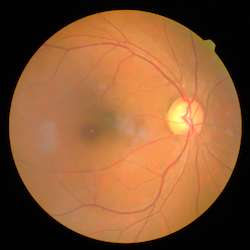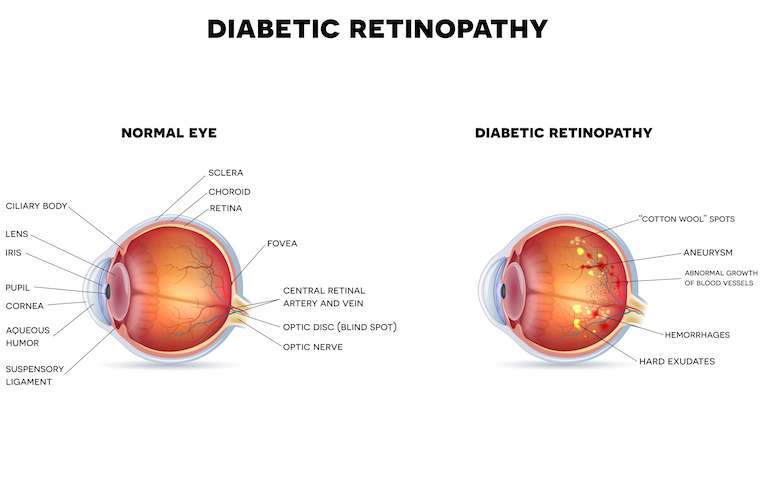Diabetic Eye Care
Learn why comprehensive eye exams are critically important for patients with diabetes or who are at-risk of developing diabetes
Sudden spikes in blood sugar levels caused by diabetes may seem relatively harmless; however, they are not. Those sudden blood sugar spikes might be damaging your eyes. If left undiagnosed and untreated, the damage to your eyes could become so severe that it might cause extensive vision problems.

Discover how Infinity Eye Care works closely with you to detect, identify, and treat vision problems caused by diabetes.
Why Choose Infinity Eye Care for Your Diabetic Eye Care?
Infinity Eye Care and Dr. Snyder are trusted by the community to provide thorough and comprehensive diabetic eye care and exams. It is our goal to diagnose vision problems caused by diabetes as soon as possible. The sooner diabetic eye problems are diagnosed, the more likely you are to reverse any damage caused by the disease.
 As part of our comprehensive eye exam at Infinity Eye Care, every diabetic patient receives retinal imaging — this allows for earlier detection of any issues versus standard eye dilation alone.
As part of our comprehensive eye exam at Infinity Eye Care, every diabetic patient receives retinal imaging — this allows for earlier detection of any issues versus standard eye dilation alone.
Dr. Snyder is a renowned eye doctor with extensive training received through his experience as an Air Force eye doctor, professor at IU Bloomington and through his tenure as the Chief of Services within Community Hospitals North and East.
Combining comprehensive eye examinations and expertise with the use of highly specialized and advanced diagnostic equipment, Dr. Snyder is able to diagnose diabetic eye problems earlier — helping to assure a lifetime of healthy and clear vision. The retinal imaging we perform allows Dr. Snyder to see the retina, the optic disc and the tiny blood vessels in the eye — providing a much wider digital view of the retina and allowing for early detection of any issues.
If damage is discovered, Dr. Snyder creates a customized treatment plan to reverse or treat any existing damage and stop further damage from occurring. The type of treatment used depends upon the severity of the damage to your eyes.
Some types of treatment we may recommend include:
- Lifestyle changes to help manage your diabetes
- Prescription medication to manage blood sugar levels
- Laser treatments
- Intravitreal steroids
- Injections of anti-angiogenic drugs
Why Does Diabetes Cause Problems with Your Eyes?
Diabetic eye disease comprises a group of eye conditions that affect people with diabetes. These conditions include diabetic retinopathy, diabetic macular edema (DME), cataracts, and glaucoma. All forms of diabetic eye disease have the potential to cause severe vision loss and blindness.
High blood sugar levels, which happens with both Type 1 and Type 2 diabetes, can cause damage to the tiny blood vessels at the back of your eyes. This happens most often when blood sugar levels are not controlled properly. When these tiny blood vessels in the eyes become damaged, you can develop what’s known as diabetic retinopathy. Early symptoms include floaters, blurriness, dark areas of vision, and difficulty perceiving colors.

Diabetic retinopathy is sometimes irreversible and blindness can occur; however, with early detection and treatment, the risk of blindness is reduced by up to 95%. Diabetic retinopathy is also the leading cause of blindness among adults in the United States. If that’s not enough, 40-45% of Americans diagnosed with diabetes have some stage of retinopathy — but only half of theses folks are aware they’ve developed the problem.
How Often Should You Schedule a Diabetic Eye Care Exam?
Even if you aren’t experiencing vision problems, such as double vision or loss of sight, it is important that you continue to schedule comprehensive eye examinations with an eye doctor. Regular eye examinations allow Dr. Snyder to monitor the health of your eyes and spot any problems before they cause extensive damage.
When and how often you should schedule diabetic eye care examinations depends upon your type of diabetes.
Eye exams should occur on the following schedule:
- Type 1 Diabetes – People with Type 1 diabetes should schedule their first eye exam within five years of their initial diagnosis. Eye exams should occur yearly after the first examination.
- Type 2 Diabetes – Yearly examinations should occur immediately upon diagnosis
- Pregnant women with Type 1 or Type 2 Diabetes – An eye exam should occur within the first three months of your pregnancy. Eye exams may be regularly scheduled every few weeks throughout your pregnancy and for the first year after you give birth.
Don’t let diabetic eye problems go undiagnosed. Book an appointment today for a comprehensive diabetic eye exam with the experienced eye doctor at Infinity Eye Care!
